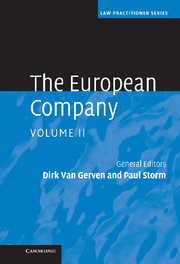8 - Latvia
from Part II - Application in each Member State
Published online by Cambridge University Press: 06 July 2010
Summary
Introduction
The Latvian European Company Act (‘SE Act’), implementing Regulation 2157/2001 of 8 October 2001 on the Statute for a European company (SE) (the ‘Regulation’) and Council Directive 2001/86/EC of 8 October 2001 supplementing the Statute for a European company with regard to the involvement of employees (the ‘Directive’), was adopted on 10 March 2005 and entered into force on 7 April 2005. In accordance with the SE Act, SEs in Latvia are subject to the laws applicable to public limited-liability companies (akciju sabiedrība) and to the legislation governing the Commercial Registry (komercreģistrs), insofar as these provisions do not conflict with the SE Act and/or the Regulation. Thus, SEs registered in Latvia shall be subject to general provisions of Latvian commercial, labour and tax law and other general and specific legislation regulating companies incorporated and operating in Latvia.
In general, the incorporation and operation of various types of legal entities in Latvia is regulated by a relatively recent law, the so-called Commercial Act (Komerclikums). When adopting the Commercial Act, the legislature intended to create an extensive regulatory framework applicable to most types of commercial undertakings. However, even though the Commercial Act could have been amended to accommodate the SE, the legislature decided not to do so and instead enacted new legislation to regulate the SE.
Reasons to opt for an SE
The reasons most often cited in the literature to opt for an SE include: (i) the possibility to operate under a single set of management and reporting rules in various jurisdictions; (ii) the ability to transfer the company's registered office to another jurisdiction (mobility); (iii) the possibility to carry out cross-border mergers; and (iv) the likelihood that companies with a ‘European” identity will be able to attract investors more easily.
- Type
- Chapter
- Information
- The European Company , pp. 231 - 251Publisher: Cambridge University PressPrint publication year: 2008



